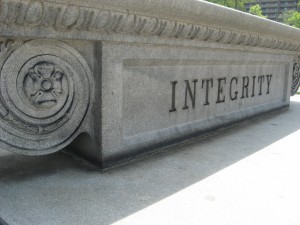It is sadly ironic that Penn State University and its leaders, concerned as they were about legacy, will perhaps best be known for their failures. Over fifteen years, at least eight young boys were molested, some at Penn State’s athletic facilities, by the defensive coach of its revered football team, Jerry Sandusky. Despite awareness of the behavior, no one in charge reported Sandusky to outside authorities, he was kept on staff and more boys were victimized. The fallout continues, but so far Penn State’s iconic head coach Joe Paterno, its Athletic Director, VP of Administration and President have lost their jobs over the matter.
I can’t help looking at Penn State through the lens of the four integrity pillars in my book Navigating Integrity – Transforming Business As Usual Into Business At Its Best: Identity, Authenticity, Alignment and Accountability.
Identity – An institution’s mission and values – its stated purpose and principles intended to govern how its work gets accomplished – serve as the foundation for its identity. At one point, Penn State’s football program was no doubt considered as means for accomplishing the University’s main ends of higher education and character formation. Over time, however, Penn’s football program likely became the sun that the rest of the University revolved around. When Penn State is mentioned, its football team is usually the first thing that comes to mind; few could name the University President, but most know about coach Joe Paterno. What began as means to an end no doubt got confused by some as the end; they neglected to keep the main thing the main thing.
My research revealed no statements about Penn State University-wide institutional values, although I did find some for individual departments and programs. Ironically, one stated value of Penn State’s athletic program is “to promote traditional values of honesty, integrity, commitment and hard work as the foundation of Penn State’s reputation and continuing success.” (italics mine) My guess is that there were no or few strong, institutional and systematic initiatives for communicating Penn State University core values, what they meant and how they would be enforced.
Authenticity – Penn State and its leaders failed the three main tests of authenticity: trueness, truth-telling and transparency. Trueness is a measure of how institutions and their leaders live up to their mission, brand promise and core values. The athletic department clearly did not live up to its stated value of “promoting traditional values of honesty, integrity, commitment and hard work . . .,” nor its published Vision to maintain a “consistently high level of competition that does not compromise the integrity which has characterized the Penn State program from its inception.” To give coach Paterno some credit, his failure to do more in the light of what he knew violated the very same ethical principles upon which he based Penn State’s football program and that accounted for much of its success.
Truth-telling and transparency failed on multiple fronts; behaviors were overlooked, details were omitted from reports, and the full ugly reality remained an inside story. Penn State and its athletic program displayed a conspiracy of silence instead of a culture of transparency – comparable to the dynamic that we’ve seen undo many institutions and that contributed to our great recession.
Alignment – Institutional cultures are products of their stories and traditions, reinforced behaviors, leadership modeling, and institutional systems like hiring, pay, training, what gets measured and performance management. As Peter Drucker said, “Culture eats strategy (and good intentions for that matter) for breakfast.” No matter what, if Penn State’s intentions, stated values and policies were not in alignment with its culture and institutional systems, they counted for little. To paraphrase Ralph Waldo Emerson, when culture and institutional systems are not aligned with stated intentions, “actions speak so loudly we cannot hear what they are saying.” If we want explanations of what transpired at Penn State, a review of who got hired or disciplined and why, what got rewarded or didn’t and why, and what people paid attention to or didn’t will reveal answers.
Accountability – I still like Roger Connors, Tom Smith and Craig Hickman’s take on personal responsibility in their book The Oz Principle: “seeing it, owning it, solving it and doing it.” Penn State’s assistant coach Mike McQueary clearly saw Jerry Sanduskey raping a 10 year-old boy in the football team’s locker room, and reported that to Paterno. Paterno reported that to Penn State’s athletic director and to campus police, but there was insufficient action and follow-through; no party took responsibility for actually solving the problem. We need to remember as Moliere said: “It is not only what we do, but what we do not do, for which we are accountable.” Why did Penn State leaders and staff look but not see? Why did they know but not act? I suspect that more answers are forthcoming, but integrity gaps in the University’s and its athletic department’s culture will account for many of the failures.
Accountability requires paying attention to what matters. If honesty and integrity really mattered, Penn State and its leaders would have paid more attention to that. They would have instituted measures and evaluation mechanisms to help them “keep the main thing the main thing.”  They would have examined their decisions and practices more thoroughly in the light of stated institutional and department values; they would have evaluated personnel and based hiring and disciplinary actions on different criteria; they would have paid as much or more attention to whether University leaders embodied University core values as to the football team’s win / loss record and how much profit it generated.
They would have examined their decisions and practices more thoroughly in the light of stated institutional and department values; they would have evaluated personnel and based hiring and disciplinary actions on different criteria; they would have paid as much or more attention to whether University leaders embodied University core values as to the football team’s win / loss record and how much profit it generated.
Penn State University is only beginning to experience the negative consequences of inadequate attention to institutional integrity. Inattention to integrity gaps of its leaders and in its culture will not only adversely affect its ethical reputation, but severely damage its brand, and in turn engagement of students and faculty, recruitment prospects, its finances and overall University effectiveness.

“If you have integrity, nothing else matters; if you don’t have integrity, nothing else matters.” (Alan K. Simpson)
Do you have clear core values or principles that serve as a guide for your decisions and actions, especially in difficult situations? Does your organization?
In any situations where decisions or actions did not model a core value or principle, why was that? What needs to be different for that not to happen again?
Where and how do you think you or your organization might be at risk because of integrity gaps, and how do you know? How can you close those integrity gaps?







Well done, Al. You write about integrity with integrity—and authority. In these times when so many business leaders seem more interested in their bonuses than doing the right thing and so many politicains seem more interested in getting reelected than solving problems, our country seems to have lost its moral compass. I hope you’ll continue to emphasize the relevance of your work by linking it to the events of the day that are on everyone’s mind.
On a personal level, I have used the core value of honesty and respect of others as my guide in determining appropriate actions in my life. These values have served me well. In a recent work meeting, I was witness to a powerpoint presentation that offered a particularly offensive slide that many in the meeting found offensive. The next day, I found the supervisor of the creator of the presentation and explained in a straightforward way how the presentation was perceived. He was apologetic and worked to resolve the problem right away, and is in the process of re-communicating the presentation in a more effective, non-offensive way with its creator. In a very pro-active manner, the manager of the department also went to our HR department to provide disclosure of the situation and how it was to be remedied. I was really impressed by this action, as it wasn’t requested by me, but demonstrated that the situation was being taken seriously and steps were being taken to assure this situation was being well managed.
I enjoyed this post.. With my background in philosophy and psychology ethical behavior is right up my alley. I think it’s interesting how we often set ourselves up for failure by espousing our virtues. I wonder if those involved in the Penn State cover up would have been more likely to come forward had they not been concerned with tarnishing the schools reputation of superior moral virtue. I’m certain that the similar situation the Catholic Church has found itself in would have come to light much earlier had those involved not been concerned with protecting the image of moral virtue that the church wanted to convey. It seems to me that a similar mentality was behind constructing a banking system that was “too big to fail” or even building an unsinkable ship or an unbeatable military. Since we are all human and fallible, perhaps it would be wise to avoid creating an image of moral superiority and instead promote our ability to admit and address our mistakes and weaknesses.
I agree. The size, reputation, and anomut of money that the university makes deterred each knowing person from going to the cops. I agree that Paterno and everyone else should have been fired. I hope this situation is exposed as much as possible. I think this scandal hits on a much larger issue though. What has the institution of college football become? If a schools reputation is so important that people are willing to cover up the raping of little boys then what else are schools covering up? It seems that these schools will protect themselves at all costs. What other rules are they knowingly breaking, or horrendous acts are they turning a blind eye too? Clearly the people with power at universities can’t be counted on to be objective disciplinarians or even moral. I have to say that I am not terribly surprised. These people make millions of dollars in profit off unpaid athletes who don’t graduate. The formula in college football is incredibly flawed. Its sad that something like this has to happen for people to see it.
No way am I making exuescs for paterno; just trying to explore the Why of all this. Why did Paterno fail to do the right thing? Why did they all fail? Because their allegiance was to protecting the football program, which had grown bloated and out of control. But there has to be more. these are people who have lost sight of right and wrong and the question is why. All I am saying is that part of the answer is that the world had passed them by. these are people who do nothing but eat, sleep and drink football. They do nothing else. They are protected from real life completely. So a guy like paterno is completely unaware of the world that has changed around him since the 1950s. That’s not an excuse for his failure. But it does begin to explain a tiny bit of the the why. if you are a sports fan as I am, you know that there is a major difference between joe paterno and some of the more awful people in college sports. Bud Wilkinson, Darrel Royal, Bear Bryant now those were bad guys. And some of these criminals coaching big fime basketball today. They are a whole different universe than paterno. Read Meat on the Hoof for a real view of what college football was like at Texas in the 50s and 60s. It will turn your stomach.